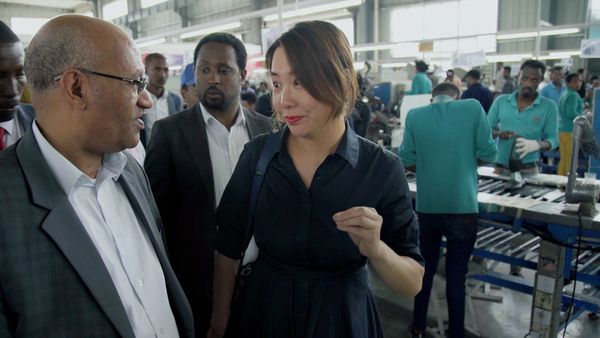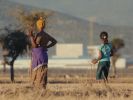Eye For Film >> Movies >> Made In Ethiopia (2024) Film Review
Made In Ethiopia
Reviewed by: Sergiu Inizian

Opening on the arranged marriage between an Ethiopian woman and a Chinese man, documentarists Max Duncan and Xinyan Yu signal the transactional relationship between the two nations. A partnership of convenience that is slowly showing its cracks. Eager to shine a light on the African nation's promise and China's vast economic ambition on the continent, the snappy camera explores the ins and outs of a massive industrial complex near the capital of Addis Ababa. As it casts a shadow over the lives of workers, farmers, managers and even officials, the structure becomes a monument of imminent progress. Facing unforeseen challenges, both locals and Chinese immigrants struggle to keep up with the relentless pace of industrial development, which takes a toll on their wellbeing and families.
Entering Eastern Industry Park, a vast complex of Chinese factories, the cinematic eye focuses on Motto, the deputy director. Her restlessness dictates the pace, guiding the camera through quality control tours and business meetings. Between formal discussions, she confides that she misses her daughter and wishes she could bring her over from China. Still, she cares deeply about promoting the Chinese work ethic and empowering Ethiopians. As she prepares to lead the expansion of the park, which is expected to bring about 30,000 jobs, she bumps into her first obstacle - villagers who haven't been repaid for their land. As it becomes apparent the locals won't vacate the upcoming construction site, Motto races against time to make it right by them, a task she'll find difficult, given the economic and political environment.

In the nearest village, Workinesh and her family struggle with the reality of their land being taken away. The contrast between their green field and the grey industrial structure speaks volumes about the abrupt changes they're facing. Their values become as small as their figures in a vast landscape of constant discrepancies. As uncertainty overwhelms them, her community finds shelter in tradition, a sacred tree taking centre stage in hopeful scenes of song and rituals.
Starting the project in 2019, the directorial duo ambitiously covers the impact of Covid-19 on the industrial complex. From workers who are forced to live in the factories to Chinese supervisors who spend their free time video-calling their families, the camera captures a deep sense of isolation along the empty assembly lines. Beyond cultural differences, employees find comfort in each other's presence. In one instance, Beti, an Ethiopian worker, and Mila, a Chinese supervisor, bond over their families, sharing experiences of pain and joy.
As the directors patiently capture the lives of Workinesh, Motto and Beti, a shared theme of familial hardship emerges. The farmer refuses to be guided by her stubborn husband's rural values and looks to the future, wanting to secure her daughter's education. As the memory of her traumatic forced marriage still haunts her, she places her effort into preparing her child for a modern world, departing from the patriarchal nature of the village. In a scene of disarming candour, Rehoboth echoes her mother's feelings, comparing her difficult life with that of other kids. Beti follows a similar narrative, having abandoned her family to pursue working and eventually completing her studies. Lacking the support of her relatives, she looks for help from her female co-workers, in an environment that seems rigged against her.
Motto's struggle stands out, as she distinctly has more agency within the economic hierarchy that materialised in Ethiopia over the last decade. And yet, she longs to be with her daughter, who has been absent for years. As she struggles to make ends meet and uphold her work ethic, her dream of seeing her child fades into the background. The tireless hand-held camera reveals her inconsolable loneliness as a symptom of Ethiopia’s modernization, which unfolds as a wearisome affair that demands heartbreaking sacrifice for the sake of aggressive development.
Reviewed on: 07 Jun 2024















